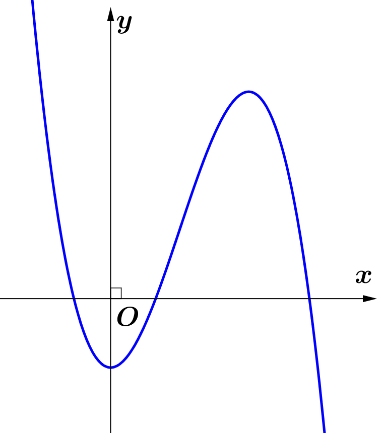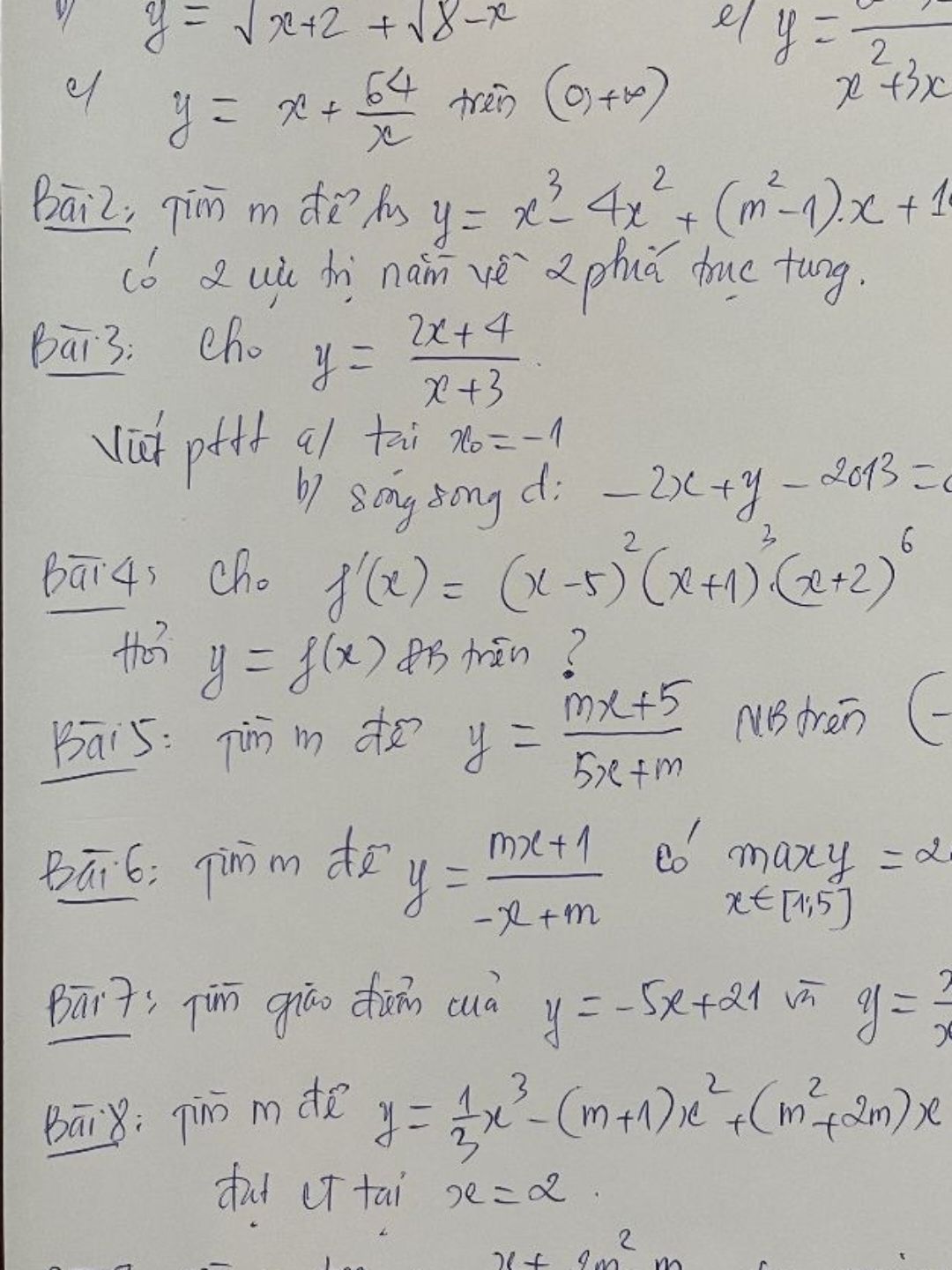Nhờ ý nghĩa hình học của tích phân, hãy tìm khẳng định sai trong các khẳng định sau:
A. \(\displaystyle \int\limits_0^1 {\ln \left( {1 + x} \right)dx} > \int\limits_0^1 {\frac{{x - 1}}{{e - 1}}dx} \)
B. \(\displaystyle \int\limits_0^{\frac{\pi }{4}} {{{\sin }^2}xdx} < \int\limits_0^{\frac{\pi }{4}} {\sin 2xdx} \)
C. \(\displaystyle \int\limits_0^1 {{e^{ - x}}dx} > \int\limits_0^1 {{{\left( {\frac{{1 - x}}{{1 + x}}} \right)}^2}dx} \)
D. \(\displaystyle \int\limits_0^1 {{e^{ - {x^2}}}dx} > \int\limits_0^1 {{e^{ - {x^3}}}dx} \)
Câu trả lời (1)
-
Đáp án A:
Xét \(\displaystyle I = \int\limits_0^1 {\ln \left( {1 + x} \right)dx} - \int\limits_0^1 {\frac{{x - 1}}{{e - 1}}dx} \) \(\displaystyle = \int\limits_0^1 {\left( {\ln \left( {1 + x} \right) - \frac{{x - 1}}{{e - 1}}} \right)dx} \)
Dễ thấy trong \(\displaystyle \left[ {0;1} \right]\) thì:
\(\displaystyle \ln \left( {x + 1} \right) \ge 0 \ge \frac{{x - 1}}{{e - 1}}\)\(\displaystyle \Rightarrow \ln \left( {x + 1} \right) - \frac{{x - 1}}{{e - 1}} \ge 0\)\(\displaystyle \Rightarrow \int\limits_0^1 {\left( {\ln \left( {1 + x} \right) - \frac{{x - 1}}{{e - 1}}} \right)dx} > 0\)
\(\displaystyle \Rightarrow \int\limits_0^1 {\ln \left( {1 + x} \right)dx} - \int\limits_0^1 {\frac{{x - 1}}{{e - 1}}dx} > 0\) \(\displaystyle \Leftrightarrow \int\limits_0^1 {\ln \left( {1 + x} \right)dx} > \int\limits_0^1 {\frac{{x - 1}}{{e - 1}}dx} \) hay A đúng.
Đáp án B: Xét \(\displaystyle \int\limits_0^{\frac{\pi }{4}} {{{\sin }^2}xdx} - \int\limits_0^{\frac{\pi }{4}} {\sin 2xdx} \)\(\displaystyle = \int\limits_0^{\frac{\pi }{4}} {\left( {{{\sin }^2}x - \sin 2x} \right)dx} \) \(\displaystyle = \int\limits_0^{\frac{\pi }{4}} {\sin x\left( {\sin x - 2\cos x} \right)dx} \)
Trong đoạn \(\displaystyle \left[ {0;\frac{\pi }{4}} \right]\) thì \(\displaystyle 0 \le \sin x \le \frac{{\sqrt 2 }}{2} \le \cos x \le 1\) \(\displaystyle \Rightarrow \sin x - 2\cos x < 0\)
\(\displaystyle \Rightarrow \sin x\left( {\sin x - 2\cos x} \right) \le 0\) \(\displaystyle \Rightarrow \int\limits_0^{\frac{\pi }{4}} {\sin x\left( {\sin x - 2\cos x} \right)dx} < 0\)\(\displaystyle \Rightarrow \int\limits_0^{\frac{\pi }{4}} {{{\sin }^2}xdx} < \int\limits_0^{\frac{\pi }{4}} {\sin 2xdx} \) hay B đúng.
Đáp án D: Xét \(\displaystyle \int\limits_0^1 {{e^{ - {x^2}}}dx} - \int\limits_0^1 {{e^{ - {x^3}}}dx} \)\(\displaystyle = \int\limits_0^1 {\left( {{e^{ - {x^2}}} - {e^{ - {x^3}}}} \right)dx} \)
Trong đoạn \(\displaystyle \left[ {0;1} \right]\) thì \(\displaystyle {x^2} \ge {x^3} \Rightarrow - {x^2} \le - {x^3}\) \(\displaystyle \Rightarrow {e^{ - {x^2}}} \le {e^{ - {x^3}}} \Rightarrow {e^{ - {x^2}}} - {e^{ - {x^3}}} \le 0\)
\(\displaystyle \Rightarrow \int\limits_0^1 {\left( {{e^{ - {x^2}}} - {e^{ - {x^3}}}} \right)dx} < 0\)\(\displaystyle \Leftrightarrow \int\limits_0^1 {{e^{ - {x^2}}}dx} < \int\limits_0^1 {{e^{ - {x^3}}}dx} \) hay D sai.
Chọn D.
bởi Nguyen Phuc 10/05/2021
Like (0) Báo cáo sai phạm
10/05/2021
Like (0) Báo cáo sai phạm
Nếu bạn hỏi, bạn chỉ thu về một câu trả lời.
Nhưng khi bạn suy nghĩ trả lời, bạn sẽ thu về gấp bội!

Lưu ý: Các trường hợp cố tình spam câu trả lời hoặc bị báo xấu trên 5 lần sẽ bị khóa tài khoản
Các câu hỏi mới
-
Cho hình chóp S.ABCD có đ y ABCD là hình vuông có cạnh bằng a. Cạnh bên SA vuông góc với mặt phẳng ABCD, góc giữa đường thẳng SC và mặt phẳng ABCD bằng 45o. Tính theo a thể tích của khối chóp S.ABCD.
01/12/2022 | 0 Trả lời
-
Tính thể tích
21/12/2022 | 3 Trả lời
-
nguyên hàm của x^2/căn(x^2+4)
14/01/2023 | 1 Trả lời
-
VIDEOYOMEDIA
điền 2 số còn thiếu vào dãy số
5 16 36 72 120 180 ... ...
ai giải giúp mình và giải thích cách giải với ạ
22/02/2023 | 0 Trả lời
-
A. 4x-2y-3z-11=0
B. - 4x+2y-3z+11=0
C. 4x-2y+3z+11=0
D. 4x+2y+3z+11=0
Mọi người giúp mình với!!!
07/03/2023 | 1 Trả lời
-
Trong không gian với hệ tọa độ Oxyz, cho điểm M (2; -1; -6) và hai đường thẳng \(d_1: \dfrac{ x−1}{2}=\dfrac{ y−1}{−1}=\dfrac{ z+1}{1}\) , \(d_2: \dfrac{ x+2}{3}=\dfrac{ y+1}{1}=\dfrac{ z-2}{2}\). Đường thẳng đi qua điểm M và cắt cả hai đường thẳng \(d_1, d_2\) tại hai điểm A, B. Độ dài đoạn thẳng AB bằng
A. \(\sqrt{38}\)
B. \(2\sqrt{10}\)
C. 8.
D. 12.
07/03/2023 | 2 Trả lời
-
- Lập phương trình đoạn thẳng d đi qua M(-3::1), N(0;1;3) và song song d2 có ptts x=3+2t: y=-t: z=-1+3t
26/03/2023 | 0 Trả lời
-
Trong không gian với hệ tọa độ \(\text{O}xyz\), cho các điểm \(A\left( 1;0;0 \right)\), \(B\left( 0;2;0 \right)\), \(C\left( 0;0;4 \right)\).Viết phương trình đường thẳng \(\Delta \) đi qua trực tâm \(H\) của tam giác \(\Delta ABC\) và vuông góc với mặt phẳng \(\left( ABC \right)\).
A. \(\Delta :\,\frac{x-1}{-4}=\frac{y}{2}=\frac{z}{1}\). B. \(\Delta :\,\frac{x-1}{4}=\frac{y-1}{2}=\frac{z}{-1}\).
C. \(\Delta :\,\frac{x}{4}=\frac{y}{2}=\frac{z}{1}\). D. \(\Delta :\,\frac{x}{4}=\frac{y-1}{-2}=\frac{z+1}{1}\).
11/05/2023 | 1 Trả lời
-
A. \(T=\frac{13}{4}\).
B. \(T=3\).
C. \(T=\frac{1}{4}\).
D. \(T=2\).
11/05/2023 | 1 Trả lời
-
Cho hàm đa thức bậc ba \(y=f\left( x \right)\) liên tục, có đạo hàm trên \(\left[ -2;2 \right]\) và có đồ thị như hình vẽ

Số điểm cực tiểu của hàm số \(y=\sqrt[3]{{{\left( f\left( x \right) \right)}^{2}}}\) là
A. 1.
B. 2.
C. 3.
D. 5.
12/05/2023 | 1 Trả lời
-
Cho hàm số \(f\left( x \right)\) liên tục trên \(\mathbb{R}\) và có \(f\left( -2 \right)=2;f\left( 0 \right)=1.\) Tính \(I=\int\limits_{-2}^{0}{\frac{{f}'\left( x \right)-f\left( x \right)}{{{e}^{x}}}dx}.\)
A. \(I=1-2{{e}^{2}}\).
B. \(I=1-2{{e}^{-2}}\).
C. \(I=1+2{{e}^{2}}\).
D. \(I=1+2{{e}^{-2}}\).
12/05/2023 | 1 Trả lời
-
Tập hợp các điểm biểu diễn số phức \(z\) thỏa mãn \(\left| 5z \right|=\left| \left( 4+3i \right)z-25 \right|\) là đường thẳng có phương trình
A. \(8x-6y-25=0\).
B. \(8x-6y+25=0\).
C. \(8x+6y+25=0\).
D. \(8x-6y=0\).
12/05/2023 | 1 Trả lời
-
A. \(2\).
B. \(4\).
C. \(1\).
D. \(3\).
12/05/2023 | 1 Trả lời
-
Cho hình lăng trụ \({ABC.A'B'C'}\) có \(A{A}'=A{B}'=A{C}'\). Tam giác \({ABC}\) vuông cân tại \({A}\) có \({BC=2a}\). Khoảng cách từ \({A}'\) đến mặt phẳng \(\left( BC{C}'{B}' \right)\) là \(\frac{a\sqrt{3}}{3}\). Tính thể tích khối lăng trụ đã cho.
A. \({V=\frac{a^3\sqrt2}{2}}\). B. \({V=\frac{a^3\sqrt2}{6}}\). C. \(V=\frac{{{a}^{3}}\sqrt{3}}{6}\). D. \(V=\frac{{{a}^{3}}\sqrt{3}}{3}\).
14/05/2023 | 1 Trả lời
-

Có bao nhiêu giá trị nguyên của tham số \(m\) sao cho phương trình \(2f\left( \sin x-\cos x \right)=m-1\) có hai nghiệm phân biệt trên khoảng \(\left( -\frac{\pi }{4}\,;\,\frac{3\pi }{4} \right)\)?
A. \(13\). B. \(12\). C. \(11\). D. \(21\).
15/05/2023 | 1 Trả lời
-
A. \(7\).
B. \(2\sqrt{53}\).
C. \(2\sqrt{58}\).
D. \(4\sqrt{13}\).
14/05/2023 | 1 Trả lời
-
A. \(m\in \left( -1\,;\,0 \right)\).
B. \(m\in \left( -2\,;\,0 \right)\).
C. \(m\in \left( -1\,;\,+\infty \right)\).
D. \(m\in \left[ -1\,;\,0 \right)\).
14/05/2023 | 1 Trả lời
-
y = x4 - x2 -22020 với trục hoành
18/05/2023 | 0 Trả lời
-
y=1/3(m+1)x^3 + (2m-1)x^2 -(3m+2)x +m. tìm m để hàm số nghịch biến trên đoạn có độ dài bằng 4
24/05/2023 | 0 Trả lời
-
tìm tất cả các hàm f(x2+y+f(y))=(f(x))2+2y , mọi x,y thuộc R
31/05/2023 | 0 Trả lời
-
Cứu câu 4

09/06/2023 | 0 Trả lời
-
giúp em giải bài toán này với ạ:
tìm các giá trị của m để hàm số: y=x^3-(m+2)x+m cực tiểu tại x=109/06/2023 | 1 Trả lời
-
ảnh đây ạ absfiinwanfandajngaibgierabai

01/08/2023 | 0 Trả lời
-
1) \(y={x}^{6}{(1-x)}^{5}\) (định lý 1,2)
2) \(y=2cos2x+1\) (định lý 2)
13/09/2023 | 0 Trả lời
-
Chóp SABCD có thể tích bằng 240 và ABCD là hbh. Gọi M, N là trung điểm SD, CD và Q là điểm bất kỳ trên SC. Thể tích tứ diện BMNQ bằng bao nhiêu ?
21/09/2023 | 0 Trả lời



